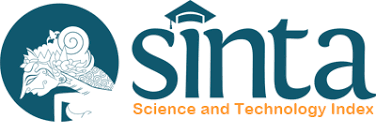Breastfeeding Self Efficacy Among Pregnant Women
Keywords:
Pregnant women, Breastfeeding, Self Efficacy, Ante Natal CareAbstract
The provision of breast milk to infants is proven to have many benefits for the health of mothers and babies, but the coverage of exclusive breastfeeding at the global and national levels is still low. Breastfeeding self-efficacy is an important factor that greatly influences the exclusivity and duration of breastfeeding for infants. The level of self-efficacy of breastfeeding can be influenced by the socio-demographic conditions of the mother. This study aims to determine the relationship between age, education, occupation and parity with breastfeeding self-efficacy in pregnant women. Analytical research method Cross sectional. The sample of the study was 30 people in the final trimester of pregnancy by purposive sampling. The independent variable data collection (age and parity) used a closed questionnaire and the dependent variable (breastfeeding self-efficacy level) was measured using a BSES questionnaire with a Likert scale. Bivariate data analysis using Chi-square test. Almost all (90%) pregnant women are of healthy reproductive age, more than some (53.33%) are primigravida, most (66.67%) have secondary education, more than some (60%) do not work, and some (50%) ) had a low level of breastfeeding self-efficacy. The results of statistical tests showed that there was an effect of parity with breastfeeding self-efficacy in pregnant women (p=<0.01), while age, education and occupation did not affect breastfeeding self-efficacy (p>0.05). It is recommended for health workers to pay more attention to and improve breastfeeding education for primigravida who do not have breastfeeding experience so that they have high breastfeeding self-efficacy.
References
Fitri D, Shofiya D. Hubungan ASI Eksklusif dan Frekuensi Sakit Pada Bayi di Surabaya Barat. AMNT. 2020 Mar 15;4(1):30.
Kemenkes RI. Profil Kesehatan Indonesia 2021. 2021; Available from: https://pusdatin.kemkes.go.id/resources/download/pusdatin/profil-kesehatan-indonesia/Profil-Kesehatan-Indonesia-Tahun-2020.pdf
WHO. Infant and young child feeding [Internet]. 2021. Available from: https://www.who.int/news-room/fact-sheets/detail/infant-and-young-child-feeding
Dinkes Propinsi Jawa TImur. Profil Kesehatan Dinas Kesehatan Propinsi Jawa Timur 2021. 2021; Available from: https://dinkes.jatimprov.go.id/userfile/dokumen/PROFIL%20KESEHATAN%202020.pdf
Fahriani R, Rohsiswatmo R, Hendarto A. Faktor yang Memengaruhi Pemberian ASI Eksklusif pada Bayi Cukup Bulan yang Dilakukan Inisiasi Menyusu Dini (IMD). SP. 2016 Nov 9;15(6):394.
Dennis CL. Breastfeeding Initiation and Duration: A 1990-2000 Literature Review. Journal of Obstetric, Gynecologic & Neonatal Nursing. 2002 Jan 1;31(1):12–32.
Muaningsih, Rachmawati, Yati Afiyanti. Studi komparasi antara breastfeeding self-efficacy pada ibu menyusui di RSSIB dengan non RSSIB dan faktor yang mempengaruhinya. University Indonesia Library [Internet]. 2013; Available from: https://lib.ui.ac.id/detail.jsp?id=20336466
Economou M, Kolokotroni O, Paphiti-Demetriou I, Kouta C, Lambrinou E, Hadjigeorgiou E, et al. The association of breastfeeding self-efficacy with breastfeeding duration and exclusivity: longitudinal assessment of the predictive validity of the Greek version of the BSES-SF tool. BMC Pregnancy Childbirth. 2021 Dec;21(1):421.
Kurniawan B. Determinan Keberhasilan Pemberian Air Susu Ibu Eksklusif. JKB. 2013 Jul 19;27(4):236–40.
Awaliyah SN, Rachmawati IN, Rahmah H. Breastfeeding self-efficacy as a dominant factor affecting maternal breastfeeding satisfaction. BMC Nurs. 2019 Aug;18(S1):30.
Muchtar AS, Fatmasanti AU, Musni M, Novianti I. EFIKASI DIRI IBU TERHADAP EFEKTIFITAS MENYUSUI IBU POST PARTUM. JurKebMal. 2021 Jan 31;7(1):11–6.
Ummah F, Sari RIK, Turlina L, Sholehah N. The Effect Of Health Education Using The Snow Balling Method Against Breastfeeding Self Efficacy In Primigravida. MIDPRO. 2020 Jun 30;12(1):77.
Ngo LTH, Chou HF, Gau ML, Liu CY. Breastfeeding self-efficacy and related factors in postpartum Vietnamese women. Midwifery. 2019 Mar;70:84–91.
Tsaras K, Sorokina T, Papathanasiou I, Fradelos E, Papagiannis D, Koulierakis G. Breastfeeding Self-efficacy and Related Socio-demographic, Perinatal and Psychological Factors: a Cross-sectional Study Among Postpartum Greek Women. Mater Sociomed. 2021;33(3):206.
Nursan C, Dilek K, Sevin A. Breastfeeding Self-Efficacy of Mothers and the Affecting Factors. Aquichan. 2014 Sep 1;14(3):327–35.
Pradanie R. Breastfeeding Self Effi cacy and Effective Breastfeeding on Postpartum Mother. Nursing. 2015 Apr 1;10(1):20.
Maleki Saghooni N, Amel Barez M, Moeindarbari S, Karimi FZ. Investigation of breastfeeding self-efficacy and its associated factors in prim parous breastfeeding mothers. ijp ; Int J Pediatr [Internet]. 2017 Oct [cited 2022 Aug 6];(Online First). Available from: https://doi.org/10.22038/ijp.2017.25656.2182
Calil VMLT, Krebs VLJ, Carvalho WB de. Guidance on breastfeeding during the Covid-19 pandemic. Rev Assoc Med Bras. 2020 Apr;66(4):541–6.
Kurnianingtyas R.T. Pengaruh Pendidikan Kesehatan Tentang Manajemen Laktasi Pada Ibu Primigravida Trimester III. Diponegoro University [Internet]. 2017; Available from: http://eprints.undip.ac.id/54614/2/Laporan_Skripsi_Rainy_Tri_K.pdf
Muhammad Fauzan P. HUBUNGAN ANTARA DUKUNGAN SOSIAL DENGAN BREASTFEEDING SELF EFFICACY PADA IBU MENYUSUI. UII Yogyakarta [Internet]. 2018; Available from: https://dspace.uii.ac.id/bitstream/handle/123456789/8308/NASKAH%20PUBLIKASI%20PDF.pdf?sequence=2&isAllowed=y
Ghasemi V, Simbar M, Banaei M, Saei Ghare Naz M, Jahani Z, Nazem H. The Effect of Interventions on Breastfeeding Self-efficacy by Using Bandura’s Theory in Iranian Mothers: A Systematic Review. International Journal of Pediatrics. 2019;7(8):9939–54.
Ghufron N, Risnawitaq R. Teori-teori psikologi [Internet]. 2017. Available from: https://opac.perpusnas.go.id/DetailOpac.aspx?id=1137840
Rike Galina Prastia Risti. Early Breastfeeding Inisiation and Breastfeeding Self Effi cacy. Sain Med [Internet]. 2016 Dec;8(2). Available from: http://dev2.kopertis7.go.id/uploadjurnal/J%20Sainmed%20vol%208%20no%202.pdf
Ahmed AA, Hassan AK, Mohamed SH, Hamad MAE. Self-efficacy of Postpartum Mothers toward Breastfeeding and the Affecting Factors. American Journal of Nursing Research. :9.
Wardani M.A. Gambaran Tingkat Self Efficacy Untuk Menyusui pada Ibu Primigravida. University of Indonesia [Internet]. 2012 Jul; Available from: https://lontar.ui.ac.id/file?file=digital/20311620-S43369-Gambaran%20tingkat.pdf
Mudaharimbi EP. Self-Efficacy of Primigravida Working Mothers in the Success of Breastfeeding. JPK. 2021 Mar 30;9(1):28.
Khresheh RM, Ahmed NM. Breastfeeding self efficacy among pregnant women in Saudi Arabia. Saudi Med J. 2018;39(11):1116–22.

















